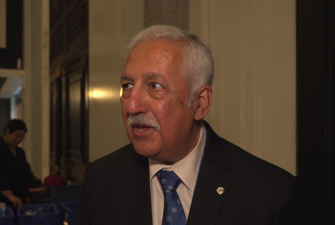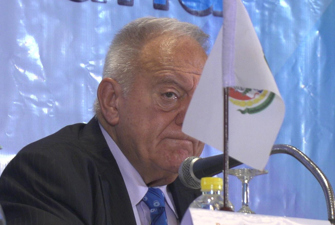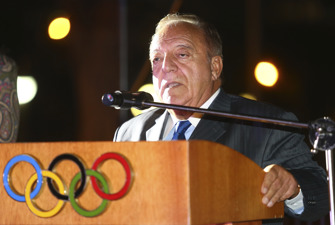With the old guard down the rabbit hole
The Olympic future of weightlifting is shaky. This is not so much due to the doping culture that was allowed to flourish for decades in the traditional Olympic sport. Now it is long-discredited officials of the International Weightlifting Federation who consider themselves untouchable. They are putting the brakes on reforms and, above all, on new elections.
It was obviously not particularly disturbing news for some weightlifting officials, when their sport was handed the latest blow in early December. IOC president Thomas Bach, after a meeting of his Executive Board, addressed “serious concerns” about the leadership of the International Weightlifting Federation (IWF) and their governance practices and then announced the sport's provisional elimination from the 2028 Olympic Games.
Actually, this puts the entire sport on the brink, because like many international federations, the IWF is financially dependent on the Olympic revenues. But anyone who thought the ban might trigger a shock wave within the sport was seriously mistaken.
In a WhatsApp group, a high-ranking IWF official immediately downplayed the news. No need to worry, he suggested to his comrades, because the IOC had not presented any facts, except the one: “The fact is always to create fear.”
An official statement from Michael Irani, the IWF interim president, did not sound alarmed either. He simply “welcomed” the IOC’s decision to maintain weightlifting’s place at the 2024 Games in Paris. (Of course, he forgot to mention that already the 2024 slot is subject to meeting specific conditions and the number of lifters has been significantly reduced.) With regard to 2028, the Briton claimed he was “confident” that the IOC’s concerns would be dispelled “as we continue to implement our wide-ranging reforms.”
And with that, welcome to the rabbit hole the IWF is going down. Further into their still bizarrely corrupt fantasyland. For in fact, there is not much to be seen in terms of “implementation” of reforms.
Examples are aplenty. For Paris 2024, Bach warned for example, the IOC would insist on a “link between the number of available quota places per country and the doping history of the respective national federation in the qualification system.” Play the Game has obtained a draft of IWF’s planned qualification rules from early December. There is nothing in it about incriminated federations getting less quota places and entering fewer Olympians like it was the case for the Tokyo Games. Instead, it is all about performance. “It's an invitation to dope,” says one official.
Aján’s companions still rule
Of course, the draft comes from the IWF Executive Board, whose mandate has long expired: Like Irani, acting “interim” for already over a year, most of them are long-term companions of former president Támás Aján, his old guard.
Aján is still under investigation for alleged criminal activities related to his IWF reign in his home country Hungary and in Switzerland as the investigators now confirmed to Play the Game. (Play the Game also approached authorities in the US, where possible financial crimes are being probed, but the request went unanswered.) In addition, the former patron and two top officials from Romania and Turkey have been charged under sports law for doping cover-ups. According to the International Testing Agency, the Court of Arbitration for Sport will decide on these cases.
The others, who lived good (and well paid) officials lives in the era of rampant doping and corruption, still dominate the IWF. Sarah Davies, the chair of IWF’s Athletes Commission, knows the board by now: “These are people who consider themselves more important than the sport. I am genuinely fearful for the future of our sport.”
So far, the board members have not let themselves be put off by numerous warnings from the IOC. In the first half of 2021, the Olympic masters repeatedly communicated “great concerns” or “serious concerns”. In response, the IWF had to adopt a new constitution, and it even sets standards for more athlete participation, gender equity, or strict doping sanctions against national federations and officials - but it is law on paper only.
The American Ursula Papandrea, who left the board last year after trying reforms and then being ousted as IWF’s interim president, says: “A governing document is only as good as those who govern. The violations of the new constitution are quite egregious as they have been blatant and demonstrate a complete disregard for rules. For the board, it seems to be politics as usual.“
Cancelled elections after eligibility checks
Indeed, these officials have no qualms about ignoring their new constitution. And they do it with impunity, an Olympic classic not only in weightlifting. Board meetings, for example, were supposed to be streamed live for the member federations, with rare exceptions allowed. The exception quickly became the rule: At least five meetings (for which an allowance is paid to board members) were held - all in camera. Not once were minutes published, another violation of the constitution.
It is a dirty dozen on the board who just don’t care.
In November, they cancelled the electoral congress planned for next week, again violating the rules. According to the constitution, elections should take place in 2021. But an independent panel had examined the eligibility of the candidates to run for the presidency and the board and reportedly eliminated most of the incumbent IWF leadership.
For example, the Russian board member Maxim Agapitov. He is not eligible because of dozens of historic Russian doping cases (more are still coming to light). He now wants to become IWF president and claims in a promotional film for his candidacy: “Our problems with drugs are absolutely well known, but all of them are in the past.“
The reality looks a bit different: According to information obtained by Play the Game, Agapitov’s federation still employs high-ranking officials and coaches from the doping era. No wonder the Russian anti-doping agency has suspended 17 lifters this year alone.
Now, Agapitov wants to change the constitution again. As he sees it, national federations should not be sanctioned, when too many of their lifters fail doping tests internationally.
That is absurd enough, given the history of weightlifting and the numerous doping scandals with officials involved. But Agapitov is not even the worst. As documented in last year’s report on the IWF by Canadian special investigator Richard McLaren, other board members are simply crooks. Only the naïve or the corrupted (of which there are many in the weightlifting family) would trust them to run an Olympic sport properly.
Board members in the “secret” McLaren report
The second part of McLaren’s report, which is declared “private and confidential” and which Play the Game has now obtained, reveals even more about the mafia-like federation and about officials who want to be re-elected to the IWF leadership.
For example, Attila Adamfi, Aján’s son-in-law, and his right-hand man for a long time. Fired by the IWF, the Hungarian now wants to become Secretary General. The secret report contains further details about how Adamfi allegedly was involved in the cash-for-vote-scandal at the last presidential elections in 2017 (winner: Aján).
About an “aide memoire”, found on his computer, the investigators conclude: “There can be little logical explanation as to why these voting aids were created, other than to ensure that those delegates who had been subjected to the bribery, did not make any mistakes when entering the voting booth.“
Some USD 67,000 had been withdrawn from IWF accounts days before the election. They went to the so-called Doha group; officials from African and Asian federations who travelled to the election via the Qatari capital. The management of this trip was reportedly handled by two current board members who want to stay on: Secretary General Mohammed Jaloud (Iraq) and Mohamad Al Mana (Qatar). The latter is not only the Asian weightlifting president; he just got elected to the Shura Council, the parliament in Qatar with only 45 MPs. One of his promises to the potential voters there sounds ludicrous in light of the sports-related suspicions: “improving management systems”.
Also mentioned in the confidential part of the McLaren report, in the section about “Financial Control”, is a top official from Peru: José Quiñones. In 2016, he was banned from all sporting offices in his homeland for financial irregularities, but was allowed to remain as IWF vice president.
At issue is an IWF event in Lima in 2019. McLaren asks if money was involved when a World Championship, originally awarded to Peru, suddenly went to Turkmenistan. Instead, Lima then hosted an extremely expensive Grand Prix. The report doubts that USD 1.2 million sponsoring money from the Peruvian government were “fully accounted for”. “A further examination of IWF books and records“ is recommended, the report reads. Quiñones, when asked, claims he had nothing to do with the Grand Prix.
As Quiñones sees things, he is already set for the next IWF Board in his capacity as president of the Pan American Weightlifting Federation until 2024. However, according to the new constitution, officials are actually “disqualified” from sitting on the board or their appointment is to be “terminated immediately” while being sanctioned by sports courts. Quiñones remained in office, when the constitution came into force on 31 August. Another rule simply ignored. When there finally are new elections, no one will bother to ask: His ban in Peru expires at the end of this year.
Is the old guard planning new candidate checks before the weightlifting officials get to elect their leaders, at some indefinite point next year? That will become clear next Monday in Tashkent, at the congress, which is now an ordinary one instead of an electoral congress.
“Fundamentally and legally wrong”
So far, the board has justified its attempt to block the elections with an advisory opinion from the federation's own Legal Commission. This opinion claims the eligibility process had not been carried out properly and that the members of the Ethics Commission should first have been “ratified” by Congress before delegating the vetting of candidates to an independent body, the Eligibility Determination Panel.
The IWF governance advisor, the Australian Darren Kane, was quite clear about this being a farce: In an email to the board, obtained by Play the Game, he calls the confirmation of the Ethics Commission a “formality” and the opinion of the legal experts “fundamentally and legally wrong.”
The Ethics Commission is similarly outraged. It responds to an enquiry with an email signed by all five members: The findings on eligibility “should stand and would not have to be repeated.”Interestingly, the commission also reveals that its investigatory chamber is preparing procedures against “numerous individuals based not only on the McLaren Report but also on various other publicly available information and related complaints.“
A new federation?
The old guard will not like the news. So will there be a clash between the IWF board and the IWF ethics and governance experts? And what about the few reformers? Papandrea, running for president, says: “I would hope that all eligible candidates are recognised as such. If there are any remaining questions, these can be cleared up without the need of starting the entire process again.“
Florian Sperl, the German federation president, is also relying on diplomacy and “lots of talks”. However, there is a contingency plan should the board continue to risk the Olympic future. “Then we will do everything to save and rebuild our sport. If necessary, we will create a new international federation.”
Such a schism would be a first in the Olympic business. It should be intriguing to see how the IOC would respond to this. After all, it is partly to blame for weightlifting’s malaise, having brushed off early warnings about corrupt practices under former IOC member Aján.
For now, the weightlifters are far from having secured their participation in the 2024 Summer Games. As IOC boss Bach has said: “So far they are in the programme. But you never know what can happen.”
Read more
Read the article 'Weightlifiting: When cleaners come with dirty hands'
Read the article 'FBI and Swiss police dig into weightlifting scandal, while IOC is undecided'Read the article 'The man who blew the whistle on his own corruption'







